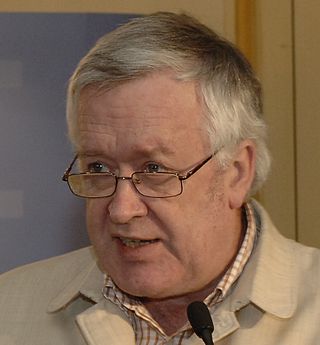
Efforts to scientifically ascertain and attribute mechanisms responsible for recent global warming and related climate changes on Earth have found that the main driver is elevated levels of greenhouse gases produced by human activities, with natural forces adding variability. The likely range of human-induced surface-level air warming by 2010–2019 compared to levels in 1850–1900 is 0.8 °C to 1.3 °C, with a best estimate of 1.07 °C. This is close to the observed overall warming during that time of 0.9 °C to 1.2 °C, while temperature changes during that time were likely only ±0.1 °C due to natural forcings and ±0.2 °C due to variability in the climate.

The global warming controversy concerns the public debate over whether global warming is occurring, how much has occurred in modern times, what has caused it, what its effects will be, whether any action can or should be taken to curb it, and if so what that action should be. In the scientific literature, there is a strong consensus that global surface temperatures have increased in recent decades and that the trend is caused by human-induced emissions of greenhouse gases. No scientific body of national or international standing disagrees with this view, though a few organizations with members in extractive industries hold non-committal positions, and some have attempted to convince the public that climate change is not happening, or if the climate is changing it is not because of human influence, attempting to sow doubt in the scientific consensus.

Patrick J. Michaels was an American agricultural climatologist. Michaels was a senior fellow in environmental studies at the Cato Institute until 2019. Until 2007, he was research professor of environmental sciences at the University of Virginia, where he had worked from 1980.

Michael Evan Mann is an American climatologist and geophysicist. He is the director of the Center for Science, Sustainability & the Media at the University of Pennsylvania. Mann has contributed to the scientific understanding of historic climate change based on the temperature record of the past thousand years. He has pioneered techniques to find patterns in past climate change and to isolate climate signals from noisy data.

William Michael Connolley is a British software engineer, writer, and blogger on climatology. Until December 2007 he was Senior Scientific Officer in the Physical Sciences Division in the Antarctic Climate and the Earth System project at the British Antarctic Survey, where he worked as a climate modeller. After that he became a software engineer for Cambridge Silicon Radio.

Global dimming is the reduction in the amount of global direct irradiance at the Earth's surface that has been observed since systematic measurements began in the 1950s. The effect varies by location, but worldwide it has been estimated to be of the order of a 4–20% reduction. However, after discounting an anomaly caused by the eruption of Mount Pinatubo in 1991, a very slight reversal in the overall trend has been observed.
Robert C. Balling, Jr. is a professor of geography at Arizona State University, and the former director of its Office of Climatology. His research interests include climatology, global climate change, and geographic information systems. Balling has declared himself one of the scientists who oppose the consensus on global warming, arguing in a 2009 book that anthropogenic global warming "is indeed real, but relatively modest", and maintaining that there is a publication bias in the scientific literature.

Hans von Storch is a German climate scientist. He is a professor at the Meteorological Institute of the University of Hamburg, and Director of the Institute for Coastal Research at the Helmholtz Research Centre in Geesthacht, Germany. He is a member of the advisory boards of the journals Journal of Climate and Annals of Geophysics. He worked at the Max Planck Institute for Meteorology from 1986 to 1995 and headed the Statistical Analysis and Modelling research group there.

Gavin A. Schmidt is a climatologist, climate modeler and Director of the NASA Goddard Institute for Space Studies (GISS) in New York, and co-founder of the award-winning climate science blog RealClimate.

State of Fear is a 2004 techno-thriller novel by Michael Crichton, his fourteenth under his own name and twenty-fourth overall, in which eco-terrorists plot mass murder to publicize the danger of global warming. Despite being a work of fiction, the book contains many graphs and footnotes, two appendices, and a 20-page bibliography in support of Crichton's beliefs about global warming. Many climate scientists, science journalists, environmental groups, and science advocacy organizations dispute the presented views as being error-filled and distorted.

Stefan Rahmstorf is a German oceanographer and climatologist. Since 2000, he has been a Professor of Physics of the Oceans at Potsdam University. He studied physical oceanography at Bangor University and received his Ph.D. in oceanography from Victoria University of Wellington (1990). His work focuses on the role of ocean currents in climate change. He was one of the lead authors of the IPCC Fourth Assessment Report.
Myles Robert Allen, is Professor of Geosystem Science in the University of Oxford's School of Geography and the Environment, and in the Atmospheric, Oceanic and Planetary Physics Department. He is the Principal Investigator of the distributed computing project Climateprediction.net, and was principally responsible for starting this project. He is the Director of the Oxford Net Zero initiative and a Fellow of Linacre College, Oxford.
Climate Audit is a blog founded in 2005 by Steve McIntyre.

Hockey stick graphs present the global or hemispherical mean temperature record of the past 500 to 2000 years as shown by quantitative climate reconstructions based on climate proxy records. These reconstructions have consistently shown a slow long term cooling trend changing into relatively rapid warming in the 20th century, with the instrumental temperature record by 2000 exceeding earlier temperatures.

The Antarctica cooling controversy was the result of an apparent contradiction in the observed cooling behavior of Antarctica between 1966 and 2000, which became part of the public debate in the global warming controversy, particularly between advocacy groups of both sides in the public arena including politicians, as well as the popular media. In his novel State of Fear, Michael Crichton asserted that the Antarctic data contradict global warming. The few scientists who have commented on the supposed controversy state that there is no contradiction, while the author of the paper whose work inspired Crichton's remarks has said that Crichton misused his results. There is no similar controversy within the scientific community, as the small observed changes in Antarctica are consistent with the small changes predicted by climate models, and because the overall trend since comprehensive observations began is now known to be one of warming.

The Discovery of Global Warming is a book by the physicist and historian Spencer R. Weart published in 2003; revised and updated edition, 2008. It traces the history of scientific discoveries that led to the current scientific opinion on climate change. It has been translated into Spanish, Japanese, Italian, Arabic, Chinese and Korean.
The Wegman Report was prepared in 2006 by three statisticians led by Edward Wegman at the request of Rep. Joe Barton of the United States House Committee on Energy and Commerce to validate criticisms made by Stephen McIntyre and Ross McKitrick of reconstructions of the temperature record of the past 1000 years, in particular the reconstructions by Mann, Bradley and Hughes of what had been dubbed the hockey stick graph.
The North Report was a 2006 report evaluating reconstructions of the temperature record of the past two millennia, providing an overview of the state of the science and the implications for understanding of global warming. It was produced by a National Research Council committee, chaired by Gerald North, at the request of Representative Sherwood Boehlert as chairman of the U.S. House of Representatives Committee on Science.
Ozone depletion and climate change, or Ozone hole global warming in more popular terms, are environmental challenges whose connections have been explored and which have been compared and contrasted, for example in terms of global regulation, in various studies and books.

Kate Marvel is a climate scientist and science writer based in New York City. She is an Associate Research Scientist at NASA Goddard Institute for Space Studies and Columbia Engineering's Department of Applied Physics and Mathematics, and writes regularly for Scientific American in her column "Hot Planet."














